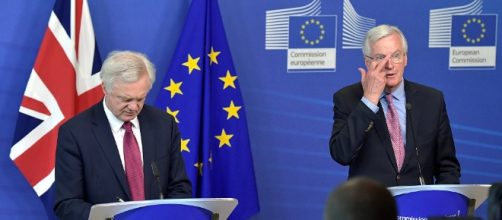The next round of Brexit discussions are due to begin this week, with the focus set to be on Ireland, EU citizens' rights and the divorce bill. The Irish border and the rights of British citizens living in Europe and European citizens residing in the UK are fundamentally important. But the divorce bill is an intended distraction which the purpose of irritating the British Government. There is no denying that Brussels owes this country money, as Peter Bone brilliantly reminded Sky News the other day. Yet that is not the way they see it.
These Brexit talks are going to fail, and Julian Jessop, Chief Economist at the Institute of Economic Affairs, is right to say that bureaucrats deserve to be blamed for this eventual outcome.
The Brexit Secretary, David Davis, deserves credit for the way he has approached these negotiations. He has scored more notable victories than many people realise. For example, the EU's Chief Negotiator, Michel Barnier, may request that the European Council allows trade discussions to be brought forward earlier than expected.
Mr. Davis has called Brussels' bluff
Whilst this is not certain, it shows Mr. Davis has called Brussels' bluff. How can the post-Brexit Irish border be decided if there is no clarification as to how a trade deal would impact cross-border transactions? Yet the EU has got its priorities completely wrong. Trade is a significant issue, and if it is not resolved, it will be German car manufacturers, French winemakers and Belgian chocolate makers that will suffer the most.
Considering Mr. Barnier is focused on how much money Britain should pay the trading bloc to leave, the Brexit Secretary is right to approach Ms Merkel and Mr. Macron for trade talks. But which body has purposefully designed the rules to prevent that from happening? The European Council. If the Brexit negotiations collapse, they and the European Commission will both be entirely responsible for causing this outcome.
They may keep us in the EU by the backdoor
In theory, it is time for Theresa May to walk away from these negotiations. They are fruitless and it appears the EU is not serious about discussing trade, the most substantial issue of all. But if the Prime Minister does leave, does she have the executive power to do that?
Would it have to go to a vote of Parliament, the majority of whom are predominantly pro-Remain? It opens up a whole new constitutional question. Considering the Conservatives lost their majority at this year's election, this will enable Brussels to dilute the Government's Brexit demands further. They may keep us in the EU by the backdoor.
Brussels has intentionally stitched the British up. The best thing to happen now is that the whole organisation collapses.

